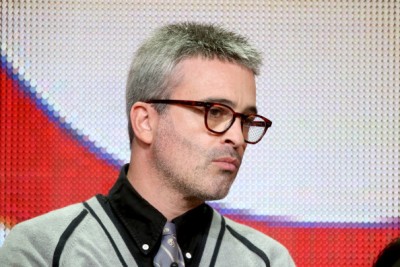I grew up watching a lot of Star Trek. It would be an understatement to say that the franchise was a big part of my life. Immediately after the last episode of Star Trek: Voyager I cut off my hair. I took Enterprise as a personal insult. If I saw J.J. Abrams I’d probably try to blind him with a strobe light while yelling, “How’s that lens flare working for you?!” I was feeling much more optimistic about the new TV series incarnation under Bryan Fuller until a couple days ago when, in an interview with Collider he told a reporter asking about casting decisions: “I’ve met with a few actors, and it’s an interesting process. There’s a few people that we like and we want to carry on what Star Trek does best, which is being progressive. So it’s fascinating to look at all of these roles through a colorblind prism and a gender-blind prism, so that’s exciting.” I try not to notice the color of flags but I’m pretty sure I’m seeing red ones.
After watching the whole rope-side interview and reading the transcript it seems that when he says “___-blind prism” Fuller is talking about an inclusionary and diverse cast. He goes on to clarify: “I think the progressive audience that loves Star Trek will be happy that we’re continuing that tradition.” This is faint reassurance. What a “progressive audience” wants out of Star Trek may not necessarily be what a diverse audience wants. Well-meaning, white progressive writers, producers, and directors, will not do the same work as a production team with diverse representation. Put another way, it is fine and right that the cast be diverse but who is behind the camera and holding the pen is just as (maybe even more) important here. The progressiveness that I heard in that interview sounded more like white people being generous: a working “for” rather than a working “with.”
As our last two essays from Apryl Williams and Jenny Davis on the newest season of Orange is the New Black (spoilers in both) have argued: having non-white characters—even a lot of them—does not get you anywhere near good race politics. What it usually delivers, in the words of Williams, are “[black people’s] stories but from a white perspective.” We can expect the same from Star Trek given that everyone working on the show (so far) is white:




The utopia depicted in the Star Trek universe is largely the construction of the white men that wrote the majority of the episodes and it is in danger of getting worse not better. So far it already hasn’t met the expectations set by its predecessors: The original series was one of the first science fiction television series with a woman as a writer and black actors like Avery Brooks, Michael Dorn, and LeVar Burton have all directed multiple episodes, many of which garnered the most accolades. Star Trek accomplished a lot with a stable of writers that woefully underrepresented the audiences it attracted and spoke to.
Moreover, if the Star Trek of 2016 is going to be as groundbreaking as it was half a century ago, it will have to achieve something beyond fair hiring practices. It would be a missed opportunity to hire everyone that does not identify as white and male, and interrogate the same utopia. The very foundations, the very premise of the Star Trek universe needs to shift and reveal the underlying mechanism that make this particular utopia work.
The franchise must undergo a shift on the order of what happened in the mid-nineties. What Trek writers called “leaving the Roddenberry Box.” Former producer Michael Piller, in an unpublished manuscript about working on the show, describes the box like this:
Roddenberry was adamant that Twenty-Fourth Century man would evolve past the petty emotional turmoil that gets in the way of our happiness today. Well, as any writer will tell you, ‘emotional turmoil’, petty and otherwise, is at the core of any good drama. It creates conflict between characters. But Gene didn’t want conflict between our characters. “All the problems of mankind have been solved,” he said. “Earth is a paradise.”
Now, go write drama.
PIller goes on to say that he actually came to respect and even be the final champion of the Roddenberry Box until he left amongst what he calls a “writers’ rebellion of sorts” after the second season of Voyager. The writers said they had to be let out of the box and both series that were running at the time, Voyager and Deep Space Nine, got immensely better. They got better not because they left the box behind, the show got better because the writers put characters in competing positions to justify the box. Utopia had to be defended.
While The Next Generation is undoubtedly a good show, the later seasons of Deep Space Nine and Voyager have a richness that made them more thought-provoking. Both of these series are meditations on justifying received values with none of the prerequisite material support that makes those values work. How do post-scarcity ethics work when you’re stranded far away from home? What does it mean to uphold exploration as your highest ideal when you are at war? To what lengths will you go to defend utopia? These shows were, as far as I can remember, the last popular pieces of culture that asked us to think in utopian terms. We need that again, especially given how shaky everything feels as of late.
Ronald D. Moore, one of the most strident critics of the Roddenberry Box, eventually ended up being one of the most prominent writers and left an indelible mark on the series. If this new series is going to do what Star Trek should do—push boundaries about what is politically, culturally, and socially possible—then we will need a shift of similar proportions and scope. What have we been missing in this utopia? What remains stubbornly scarce in a post-scarcity utopia? In a world where you can transport across the planet in a fraction of a second, what keeps regional cultures alive? Is Sisko’s Creole Kitchen more like an Olive Garden in Tuscany—a chain restaurant mimicking what it is situated in—or is that no longer a useful distinction? Is whatever we might call “Italian culture” today enacted solely in places like the Olive Garden in the 24th century? Might we be disgusted by a society that is utterly and completely free and happy? I want to see those stories.
Star Trek was never progressive, it was utopian. It makes sense though that Fuller would characterize Star Trek as both “progressive” and “color blind” because that is, in a sense, what Gene Roddenberry had made in retrospect. But at the time it was not merely progressive, it was utopian. Utopias, like the Roddenberry Box, don’t just let us display the final result of a certain kind of politics, they let us interrogate the very foundations of our politics. They let us bring ideas to their logical and illogical conclusions and, in so doing, gives us a crucible in which to crush them up, mix them, and come up with brand new ideas. Utopic story telling should not be blind to anything: it should meet race, class, gender, and any other social structure head on and complicate it beyond comprehension. What comes out the other side should be a little unnerving, exciting, and dangerous. Exactly what the future should be.
David is on Twitter: @da_banks

Comments 1
davidly — June 27, 2016
Well, there *is* the ethic explored quite early in the franchise — as represented by a white-mansplaining Capt. Kirk — that it was an imperative duty to outfit any & all opposing beings to equally armed levels of warring existence, a philosophy rooted firmly in the prevailing Cold War balance of power logic of the time. Whether progressives like that idea or not, those who have claimed to represent them over these decades have done nothing to counteract that interventionist approach and have indeed underwritten the philosophy during every legislature period since the inception of the original series. In that light, Star Trek is as progressive as progressivism, though I'm not sure how progressive progressivism is.
Maybe an appropriate analogy to the stated need for diversity at the helm of such utopian ethics would be that it is not enough to have an African-American who sits in the White House and benefits those who exploit actual Africans, but we need African-Americans atop the boards of the military industrial corporate structure.